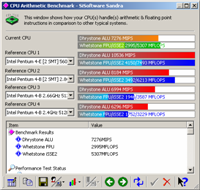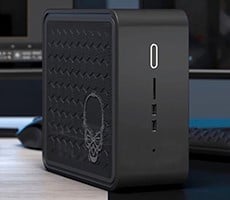Epox eX5-320S SFF PC
How we configured our test systems: When configuring the test systems for this review, we first entered the system BIOS and set each board to their "Optimized" or "High-Performance Defaults". The hard drive was then formatted, and Windows XP Professional with Service Pack 2 was installed. When the installation was complete, we hit the Windows Update site and downloaded all of the available updates, with the exception of the ones related to Windows Messenger. Then we installed all of the necessary drivers, and removed Windows Messenger from the system altogether. Auto-Updating and System Restore were also disabled, and we setup a 768MB permanent page file on the same partition as the Windows installation. Lastly, we set Windows XP's Visual Effects to "best performance", installed all of our benchmarking software, defragged the hard drives and ran all of the tests.
For our comparison testing, we chose two other Springdale motherboards: the first one being the Shuttle FB61, which is housed in another Small Form Factor system, found in our review of the SB61G2 from last year, and the other being the Asus P4P800 Deluxe, set up in an ordinary tower. In this manner, we hope to explore how the Epox eX5-320S fares against a comparable SFF as well as one of the better full-sized i865 boards that we have encountered.
|
| SYSTEM 1: Epox eX5-320S "Mini-Me" Intel i865G Intel Pentium 4 2.4GHz 2x256MB Kingston HyperX DDR NVIDIA GeForce FX 5900XT On-Board 10/100 Ethernet On-Board Audio WD "Special Edition" 40GB HD 7,200 RPM IDE Windows XP Pro SP2 NVIDIA Forceware v61.77 DirectX 9.0c |
SYSTEM 2: Shuttle SB61G2 (FB61) Intel i865G Intel Pentium 4 2.4GHz 2x256MB Kingston HyperX DDR NVIDIA GeForce FX 5900XT On-Board 10/100 Ethernet On-Board Audio WD "Special Edition" 40GB HD 7,200 RPM IDE Windows XP Pro SP2 NVIDIA Forceware v61.77 DirectX 9.0c |
SYSTEM 3: Asus P4P800 Deluxe Intel i865PE Intel Pentium 4 2.4GHz 2x256MB Kingston HyperX DDR NVIDIA GeForce FX 5900XT On-Board 10/100/1000 Ethernet On-Board Audio WD "Special Edition" 40GB HD 7,200 RPM IDE Windows XP Pro SP2 NVIDIA Forceware v61.77 DirectX 9.0c |
|
We began our testing with SiSoftware's SANDRA, the System ANalyzer, Diagnostic and Reporting Assistant. SANDRA consists of a set of information and diagnostic utilities that can provide a host of useful information about your hardware and operating system. We ran three of the built-in sub-system tests that partially comprise the SANDRA 2004 suite (CPU, Multimedia, and Memory). All of these tests were run with the Epox eX5-320S powered by a Pentium 4 2.4GHz CPU with 512MB of DDR.
 SANDRA CPU Benchmark Pentium 4 @ 2.4GHz 512MB DDR (CL2) |
 SANDRA Memory Benchmark Pentium 4 @ 2.4GHz 512MB DDR (CL2) |
 SANDRA Multimedia Benchmark Pentium 4 @ 2.4GHz 512MB DDR (CL2) |
Even with the steady updates from SiSoft, it's sometimes hard to exactly match up the system you're testing with reference systems in Sandra's database. What we've done instead is to try to find a range of systems that should provide some comparisons to the performance level of the eX5-320S. The CPU benchmark had our P4 2.4C CPU performing at levels slightly behind the P4 2.8B reference numbers, yet well above the 2.66 GHz and 2.4 GHz versions. As far as the memory scores went, the eX5-320S put up a solid effort, eclipsing the older chipsets, yet falling shy of the reference numbers for an 865PE board with 512MB of DDR. The multimedia benchmark was the most impressive of all, where the Epox eX5-320S was only a few points slower in the Integer test, but slight better in the Floating Point, when compared to a much faster 3.2Ghz CPU.






